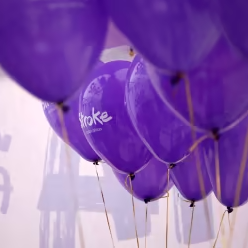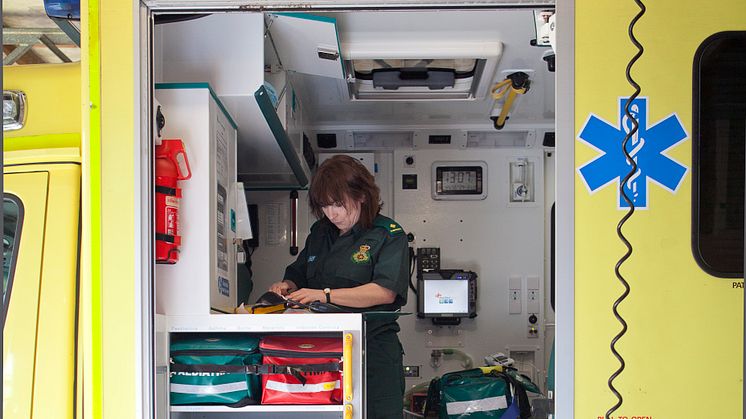
Press release -
Thousands could be spared devastation of stroke
A new report, published today by the Stroke Association, reveals that over 110,000 people could be saved from having a stroke by 2035 if research into the latest stroke prevention procedures were properly funded.
The charity’s latest report, Current, future and avoidable costs of stroke in the UK (i), warns that over the next 20 years, more people every year will be living with stroke, and by 2035 there will be over two million stroke survivors in the UK, with around 700,000 living with long-term disabilities. However, the findings also reveal that a £10 million investment into prevention research could change the story and save 114,000 people from having a stroke. (ii)
Dominic Brand, Director of External Affairs at the Stroke Association, said: “The fact is that most strokes are preventable but there’s still a lot we don’t know. This report highlights some of the key areas that desperately need investment. We are currently funding a number of smaller studies focusing on stroke prevention, including blood pressure management, treatments for atrial fibrillation (AF), and the prevention of haemorrhagic stroke. These latest findings show that a £10 million investment into these types of studies could save over 110,000 people from having a stroke by 2035.
“The annual number of stroke survivors is expected to increase dramatically by 2035 and the cost to the NHS is set to rise to over £10 billion in 2035 (from around £3 billion) in 2015. It’s clear that we need to act now to prevent the UK from sleepwalking towards a stroke crisis.”
Currently, the Stroke Association estimates that there are over 1.2 million stroke survivors in the UK, with someone experiencing a stroke every five minutes. Around 835,000 people in England are known to have AF, (iii) which increases a person’s risk of stroke five times.(iv) However, many patients are on a treatment that is not effectively lowering their stroke risk, and, an estimated 250,000 people are living with undiagnosed AF. (v) Around eight million people have been diagnosed with high blood pressure, (vi) which is the biggest controllable risk factor for stroke. Yet four in ten people are not receiving appropriate treatment to manage their blood pressure, (vii) and it’s thought that around five million people are unaware that they have the condition in England alone.(viii)
Dominic Brand continued: “Stroke causes a greater range of disabilities than any other condition, but research into stroke remains underfunded. For example, haemorrhagic stroke is the most deadly type of stroke, and those patients who do survive are more likely to experience severe disability.(ix) But currently there are no effective treatments for these strokes, which are caused by bleeds rather than clots in the brain. We urgently need to find effective ways to prevent the devastation that haemorrhagic stroke can bring, as well preventing and managing conditions with a higher risk of stroke, such as AF and high blood pressure.”
The study, which was sponsored by Legal & General, was undertaken at Queen Mary University of London and London School of Economics. The researchers took into account likely changes to the population, as well as expert views on potential future trends in the numbers of first-time strokes and survivors after stroke each year when calculating these latest projections. The team also estimated the benefits of investing more funds into stroke research.(x)
Professor Anita Patel, who led the research, said: “Our findings suggest that more people are likely to survive stroke over the next 20 years, and by 2035 many hundreds of thousands of stroke survivors will be living with long-term disabilities.
“Increasing our investment into stroke research will help us turn the tide for people with a higher risk of stroke, allowing us to take steps to prevent the condition more widely. For example, we know that current treatments for high blood pressure do not work for everyone, and are not always used properly. More research could help us discover which medication and dosage works best for different people, ensuring we can help prevent more people from having a stroke. This is in turn would help to ease the pressure on the already overstretched NHS budgets.”
Graham Precey, Head of Corporate Responsibility and Ethics at Legal & General said: “Investing to improve the population’s health against the risk of stroke makes economic sense. We are faced with a growing burden of chronic disease that is not sustainable. We need to act now to help reduce the impact of disease and disability to create a healthier world. Research into preventing stroke needs to be prioritised if we want to change the story for stroke.”
The Stroke Association’s Change The Story campaign, aims to highlight the underfunding of stroke research and calls on people to donate to towards research funding. People can do this by visiting our website www.stroke.org.uk/change and also get more information about the report Current, future and avoidable costs of stroke in the UK (Part 1).
Ends
For interviews with Stroke Association spokespeople and case studies, please contact the Stroke Association’s media team on 020 7566 1500 or email press@stroke.org.uk
For urgent out of hours media enquiries only please call 07799 436 008. ISDN facilities available.
Notes to editors
- (i)Current, future and avoidable costs of stroke in the UK (Part 1). Produced by the Centre for Primary Care & Public Health, Queen Mary University of London and the Personal Social Services Research Unit, London School of Economics and Political Science for the Stroke Association. Research carried out by Anita Patel, Vladislav Berdunov, Derek King, Zahidul Quayyum, Raphael Wittenberg, Martin Knapp (August 2017)
- (ii)This calculation is based on the position that better implementation of successful, evidence-based stroke prevention activities (such as AF and blood pressure control) could reduce the incidence of stroke by 5% from 2025 to 2029, and by 10% from 2030 onwards. This would lead to 114,000 fewer people living with stroke in 2035 than if these measures were not put in place
- (iii)National Clinical Guideline Centre, NICE atrial fibrillation: The management of atrial fibrillation, Clinical guideline methods, evidence and recommendations, June 2014
- (iv)Savelieva I, Bajpai A, Camm AJ (2007). Stroke in atrial fibrillation: Update on pathophysiology, new antithrombotic therapies, and evolution of procedures and devices. Annals of Medicine 39: 371-391
- (v)NICE, Thousands of strokes in people with common heart rhythm disorder are avoidable, says NICE. Available at: https://www.nice.org.uk/guidance/cg180/resources/thousands-of-strokes-in-people-with-common-heart-rhythm-disorder-are-avoidable-says-nice
- (vi)QOF 2015-16: Prevalence, achievements and exceptions at regional and national level. Accessed: 06/09/17 http://www.content.digital.nhs.uk/catalogue/PUB22266/qof-1516-prev-ach-exc-reg-nat-v2.xlsx
- (vii)Tackling blood pressure: the size of the prize – Dr Matt Kearney and Professor Huon Gray https://www.england.nhs.uk/rightcare/2017/01/24/matt-kearney-huon-gray/
- (viii)Public Health England. Cardiovascular disease key facts: 7 Hypertension. 2013
- (ix)Bhalla A, Wang Y, Rudd A, Wofle CD (2013). Differences in outcome and predictors between ischemic and intracerebral hemorrhage:the South London Stroke Register. Stroke 44: 2174-2181
- (x)Their calculations were based on the estimate that clinical trials cost around £2 million each, and it usually requires a number of these, often around five, to deliver an intervention that is cost-effective and will change clinical practice. This would therefore require a £10 million investment in prevention research
Related links
Topics
Categories












